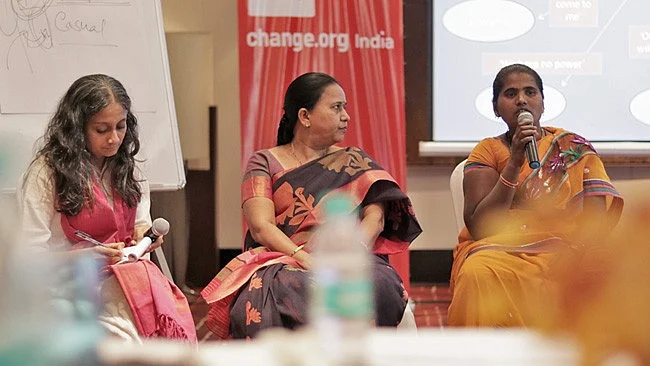Rama Devi breaks down when she talks about her daughter. She had her when she was around 15 or 16 years old. But when the child was just five months old, they were separated. Rama was trafficked to a brothel in Bhiwandi from Rayachoti in Kadapa district, Andhra Pradesh.
When she managed to come back home after a year, she found to her shock that her husband had made no effort to either look for her, or enquire after their daughter, who was living with her parents.
What hurt her the most, however, is her one-and-a-half-year-old daughter not recognising her when she returned. “When I came back, she asked who I was. ‘You are not my mother,’ she said”, Rama recounts, her voice choking with emotion.
Rama was one of the hundreds of vulnerable children in India who are trafficked into commercial sex work. At a workshop on commercial sexual exploitation of children organised by Change.org, Change Mantras and The News Minute in Bengaluru on Wednesday, Rama Devi shared her story, and how she came to rescue other girls who were trafficked to Bhiwandi.
Domestic Abuse and Dowry Harassment
Rama was 14 years old when she was married off. Domestic abuse for not bringing enough dowry was a routine part of her life. And when she got pregnant shortly after being married, the harassment only increased.
Unable to bear it anymore, Rama went back to her parents’ place. Fortunately, her parents were supportive of her decision and told her to stay with them. She delivered her baby girl at her natal home.
She would have continued living there, but when her husband came to take her back shortly after their daughter was born, Rama agreed to go back to her marital home.
However, the harassment from her mother-in-law did not stop. “She used to keep taunting me that because of me, she was having to work”, Rama said. Ultimately, the mistreatment compelled her to leave and come back to live with her parents.
Trafficked to Bhiwandi
Rama’s parents had started working in a brick kiln. The teenager used to stay at home with her infant daughter and made friends with a girl named Pushpa. Around this time, two women and a man started befriending the duo and would talk to them when Rama’s parents were away. The women were the age of Rama’s mother, so the teenagers did not suspect them.
“One day, they told us to come with them to watch a film. They said I could leave my daughter at home because we’d come back shortly”, Rama narrates. “During the interval, they gave us some cool drinks. I don’t remember what happened after that.”
The next thing she remembers is waking up in Bhiwandi in a brothel. She learnt that she and Pushpa had been sold for Rs 1,00,000.
“We wanted to go home but they did not let us. We were beaten up, kept captive, not given food… I was desperate to see my parents and my baby”, Rama recounts.
Despite the brothel managers doing everything to break the girls’ spirits, Rama kept wanting to return home. She started telling the others girls that they should all make a plan and escape the place.
However, one of the girls figured out what Rama was planning, and told the brothel managers. Things took an ugly turn then.
I was made to suffer a lot. They made some chilli paste and put it in my eyes. They tortured me.Rama Devi
Return Home, and the Criminal Case
Rama’s ordeal went on for a year – until one day, when the brothel managers decided to send her and Pushpa back. They were apprehensive that they would mobilise the other girls to rebel and run away.
Rama and Pushpa were put on an Anantapur-bound train.
When I reached back home, I was very sad to see that my parents were in a lot of debt. They had put a lot of money to try and look for me… My daughter also didn’t recognise me.Rama Devi
Eventually, Rama came in contact with an NGO called 'Reds', with whose help she decided to take legal recourse against her traffickers.
However, she says the police complaint was not filed for six months.
It was only when TV9 approached us and I did an interview with them that senior police officials stepped in and filed a complaint.Rama Devi
The court case went on for four years. “The judge and the defence lawyer asked me in court if I was doing all this for money. They even offered an out of court settlement. But I did not agree,” Rama states.
Her traffickers were convicted in 2016. They were awarded seven years’ imprisonment and Rs 50,000 as fine.
Becoming a Campaigner
Rama’s determination to get justice was not limited to getting those who wronged Pushpa and her convicted. She went a step further, in 2011, she went back to Bhiwandi and rescued 30 girls from there.
Now, she works with 10 other women in her hometown in Kadiri, Andhra Pradesh, to spread awareness about the dangers of trafficking and commercial sexual exploitation.
The media should highlight the conditions of poverty we live in, especially agricultural families. There are few alternate employment options, and no proper access to education. This forces women and children in the families to look for other means of livelihood. They then fall prey to these traffickers who falsely promise better employment.Rama Devi
“I am here, telling my story to the media because I don’t want this to happen to anyone else. But we need media to work harder to make people aware of trafficking”, she adds.
(This article was originally published on The News Minute and has been republished here with permission)
(At The Quint, we question everything. Play an active role in shaping our journalism by becoming a member today.)
